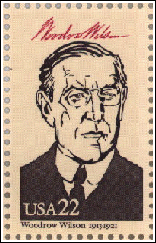Presidential Powers
The office of President of the United States is one of the most powerful in the world. The president, the Constitution says, must "take care that the laws be faithfully executed." To carry out this responsibility, he or she presides over the executive branch of the federal government -- a vast organization numbering several million people -- and in addition has important legislative and judicial powers.Legislative Powers
Despite the Constitutional provision that "all legislative powers" shall be vested in the Congress, the president, as the chief formulator of public policy, has a major legislative role. The president can veto any bill passed by Congress and, unless two-thirds in each house vote to override the veto, the bill does not become law. Much of the legislation dealt with by Congress is drafted at the initiative of the executive branch. In an annual and special messages to Congress, the president may propose legislation he or she believes is necessary. If Congress should adjourn without acting on those proposals, the president has the power to call it into special session. But, beyond all this, the president, as head of a political party and as principal executive officer of the U.S. government, is in a position to influence public opinion and thereby to influence the course of legislation in Congress. To improve their working relationships with Congress, presidents in recent years have set up a Congressional Liaison Office in the White House. Presidential aides keep abreast of all important legislative activities and try to persuade senators and representatives of both parties to support administration policies.
Judicial Powers
Among the president's constitutional powers is that of appointing important public officials; presidential nomination of federal judges, including members of the Supreme Court, is subject to confirmation by the Senate. Another significant power is that of granting a full or conditional pardon to anyone convicted of breaking a federal law -- except in a case of impeachment. The pardoning power has come to embrace the power to shorten prison terms and reduce fines.
Executive Powers
Within the executive branch itself, the president has broad powers to manage national affairs and the workings of the federal government. The president can issue rules, regulations and instructions called executive orders, which have the binding force of law upon federal agencies. As commander-in-chief of the armed forces of the United States, the president may also call into federal service the state units of the National Guard. In times of war or national emergency, the Congress may grant the president even broader powers to manage the national economy and protect the security of the United States.
The president chooses the heads of all executive departments and agencies, together with hundreds of other high-ranking federal officials. The large majority of federal workers, however, are selected through the Civil Service system, in which appointment and promotion are based on ability and experience.
Powers In Foreign Affairs
 Under the Constitution, the president is the federal official
primarily responsible for the relations of the United States with
foreign nations. Presidents appoint ambassadors, ministers and
consuls -- subject to confirmation by the Senate -- and receive
foreign ambassadors and other public officials. With the
secretary of state, the president manages all official contacts
with foreign governments. On occasion, the president may
personally participate in summit conferences where chiefs of
state meet for direct consultation. Thus, President Woodrow
Wilson headed the American delegation to the Paris conference at
the end of World War I; President Franklin D. Roosevelt conferred
with Allied leaders at sea, in Africa and in Asia during World
War II; and every president since Roosevelt has met with world
statesmen to discuss economic and political issues, and to reach
bilateral and multilateral agreements.
Under the Constitution, the president is the federal official
primarily responsible for the relations of the United States with
foreign nations. Presidents appoint ambassadors, ministers and
consuls -- subject to confirmation by the Senate -- and receive
foreign ambassadors and other public officials. With the
secretary of state, the president manages all official contacts
with foreign governments. On occasion, the president may
personally participate in summit conferences where chiefs of
state meet for direct consultation. Thus, President Woodrow
Wilson headed the American delegation to the Paris conference at
the end of World War I; President Franklin D. Roosevelt conferred
with Allied leaders at sea, in Africa and in Asia during World
War II; and every president since Roosevelt has met with world
statesmen to discuss economic and political issues, and to reach
bilateral and multilateral agreements.
Through the Department of State, the president is responsible for the protection of Americans abroad and of foreign nationals in the United States. Presidents decide whether to recognize new nations and new governments, and negotiate treaties with other nations, which are binding on the United States when approved by two-thirds of the Senate. The president may also negotiate "executive agreements" with foreign powers that are not subject to Senate confirmation.
